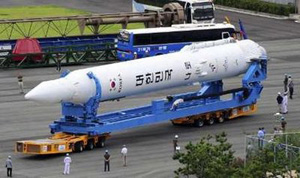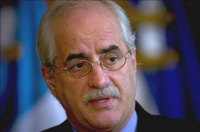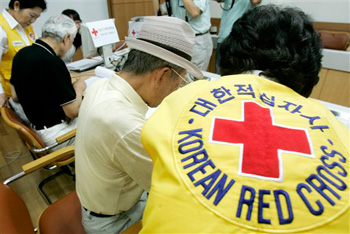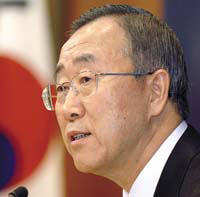News of the Region
South Korea rocket takes off, satellite launch fails
 Goheung, South Korea (AP) —South Korea's first rocket launched Tuesday August 25th failed to push a satellite into its orbit but the flawed mission may still anger rival North Korea, coming just months the communist nation's own launch drew international condemnation.
Goheung, South Korea (AP) —South Korea's first rocket launched Tuesday August 25th failed to push a satellite into its orbit but the flawed mission may still anger rival North Korea, coming just months the communist nation's own launch drew international condemnation.
The failure dealt a blow to Seoul's quest to become a regional space power. It comes against the complex backdrop of relations on the Korean peninsula — and recent signs that months of heightened tension over the North's nuclear program may be easing.
Also on the same day, a South Korean newspaper reported that North Korea has invited top envoys of President Barack Obama for the first nuclear negotiations between the two countries under his presidency, but Washington quickly said it has no plans to send the envoys to Pyongyang.
The two-stage Naro rocket, whose first stage was designed by Russia, was South Korea's first launch of a rocket from its own territory. It lifted off Tuesday from South Korea's space center on Oenaro Island, about 290 miles (465 kilometers) south of Seoul. The rocket was carrying a domestically built satellite aimed at observing the atmosphere and oceans.
Argentine Foreign Minister visited South Korea
 Seoul (Telam) – Argentina´s Foreign Minister, Jorge Taiana, held on Monday August 31st a bilateral meeting with Minister of Foreign Affairs and Trade of the Korea Republic, Yu Myung-hwan, as part of the two days official visit in that country.
Seoul (Telam) – Argentina´s Foreign Minister, Jorge Taiana, held on Monday August 31st a bilateral meeting with Minister of Foreign Affairs and Trade of the Korea Republic, Yu Myung-hwan, as part of the two days official visit in that country.
Taiana said in Seoul that "we have made progress to expand the supply of Argentine goods in Korea and to step up the Korean investments", he stressed that bilateral relations "are very good" and stood out the "constant and significant trade growth in the recent years".
The Foreign Minister of Argentina stressed that grow “reached US$ 1.5 Bln", especially since "the visit of President Roh Moo-hyun to Buenos Aires in 2004 and the agreements with former president Néstor Kirchner.
During the meeting, the officers analyzed the bilateral trade dynamics and the process of expanding the Argentina's export supply, the possibilities of Korean investments in areas such as biotechnology, energy, electronics and mining, as well as the international economic situation with a view to upcoming G20 meeting in Pittsburgh.
At the end of the meeting, both foreign ministers signed a Mutual Legal Assistance Treaty in Criminal Affairs that will allow providing and receiving assistance in criminal matters including taxation, customs and financial matters.
Also, Foreign Minister Jorge Taiana maintained an encounter with Korean President, Lee Myung-Bak, within the framework of a work agenda of two days in Korea. During the meeting, the Korean Head-of-State accepted the invitation of Argentine President Cristina Fernández de Kirchner to visit Argentina in 2010.
Two Koreas Reach Agreement on Inter-Korean Family Reunions
 Seoul, (AP) - South and North Korea have agreed to resume reunions this month for families separated by the Korean War. After a near two-year suspension the gatherings will now take place from September 26th to October 1st prior to Korea’s traditional holiday of Chuseok with the number of participating families set at 100 from each side.
Seoul, (AP) - South and North Korea have agreed to resume reunions this month for families separated by the Korean War. After a near two-year suspension the gatherings will now take place from September 26th to October 1st prior to Korea’s traditional holiday of Chuseok with the number of participating families set at 100 from each side.
Red Cross officials from the two countries wrapped up three days of talks issuing a joint statement which says they will hold reunions at two separate locations: a group reunion at a venue in the Mount Geumgang resort and an individual one at a hotel there.
As for other humanitarian issues the two sides pledged to further negotiate aiming to improve inter-Korean ties. Regular traffic across the heavily fortified border dividing North and South Korea was restored the first week of September, officials in Seoul said, amid further signs of improved relations between the two nations.
The resumption of regular border traffic between North and South Korea is the latest indication of efforts by Pyongyang to reach out to Seoul and Washington, after months of provocations that included nuclear and missile tests. The North had severely restricted traffic across the border since December. The clampdown affected the flow of goods and personnel to and from a joint factory park in the northern city of Kaesong.
Korea leads OECD in economic recovery
Korea's economy expanded at the fastest pace in the second quarter of this year among the OECD member economies, data showed the last days of August. The country's gross domestic product grew 2.3 percent in the April-June period from three months earlier, the highest rate among the 29 members of the Organization for Economic Cooperation and Development.
The OECD average for the second-quarter growth rate stands at 0 percent. The European Union reported a minus 0.3 percent, while G7 economies had an average of minus 0.1 percent.
Korea was among the only two OECD members that reported a positive growth rate in the first quarter. Poland reported that its economy had expanded 0.4 percent during the period.
Korea reported a 0.1 percent GDP gain in the first three months of this year, following a 5.1 percent contraction in the final quarter of 2008.
The OCED data adds to a brightening outlook for Korea that the Asia's fourth-largest economy, despite its high dependence on overseas markets, is fast emerging from the initial shock of a global credit crunch and ensuing slump in the global market.
UN leader, Ban Ki Moon, defends leadership style amid criticism
 Oslo (Reuters) - U.N. Secretary-General Ban Ki-moon brushed off a Norwegian diplomat's stinging criticism of his leadership style and personality as a matter of differing cultures and traditions in the world agency.
Oslo (Reuters) - U.N. Secretary-General Ban Ki-moon brushed off a Norwegian diplomat's stinging criticism of his leadership style and personality as a matter of differing cultures and traditions in the world agency.
Norway's U.N. Ambassador Mona Juul accused the South Korean of weak leadership, lack of charisma and angry outbursts in an internal memo that leaked to Norwegian news media last month.
"Personally, I admit that it doesn't feel good to be criticized sometimes, but I am always looking to improve my role and my performance as a secretary-general," Ban told reporters during a visit to Oslo. He noted that the U.N. consisted of people from all over the world with different backgrounds.
"We need to be able to respect the culture, tradition and leadership style of each and every leader," he said. "Different circumstances may require different leadership style and different charisma. I have my own charisma, I have my own leadership style."




